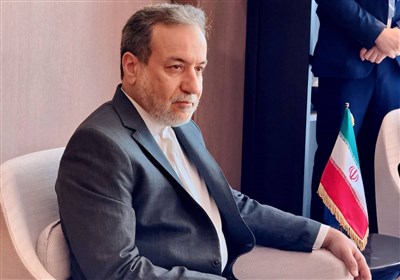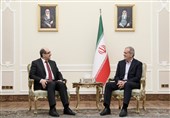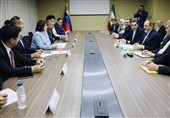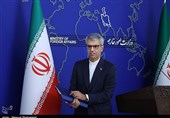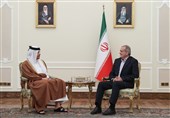US Provoking Crises in Eurasia to Gain More Foreign Investment: Italian Author
TEHRAN (Tasnim) – An Italian author and geopolitical analyst explained about the "dollar cycle" strategy implemented by the Deep State and said Washington provokes crises in Eurasia to drain foreign investment to the US.
“To provoke crises in Eurasia to drain foreign investment to the US and the purchase of American government bonds is the "dollar cycle" strategy implemented by the Deep State with stars and stripes,” Stefano Vernole, the head of External Relations at the Eurasia Mediterranean Study Center, told Tasnim in an interview.
Vernole, a graduate in contemporary history and analysis of conflicts, ideologies, and politics in the contemporary world, has worked in the field of bibliographic cataloging and in the field of public administration. Stefano Vernole is Deputy Magazine Editor of "Eurasia", a journal of geopolitical studies, and Coordinator of "Centro Studi Eurasia e Mediterraneo". He is the author of Ex-Yugoslavia: Dirty Game in the Balkans, National Fragmentation and Geopolitical Risk of Kosovo (2013), The Serbian Question and the Kosovo Crisis (2008), as well as co-author of The struggle for Kosovo (2007), Tibet Crossroads between Past and Future (2014), Discovering Tibet (2015), and Lo Xizang (Tibet) and the New Silk Road (2016).
The following is the full text of the interview:
Tasnim: The US, with its “America First” policy, has moved away from its allies over the past two years and diminished US international participation in international organizations. First, Washington urged its NATO allies to bear the costs of the transatlantic alliance, then it pressured South Korea and Japan, and now the EU is under US pressures. In your opinion, can this change of approach be interpreted as a new trend in the world order?
Vernole: Certainly, Donald Trump's attitude partially contrasts with that geopolitical trend that, since 1999, had entrusted NATO with the role of global gendarme for the protection of the interests of the United States first and for allied / vassal in the second place. Trumpian nationalism has gone so far as to hope, at least in words, for the end of US global interventionism in favor of a retreat on its national interests. How concretely feasible this is controversial; in fact, we are talking about a country that owns about 1000 military bases scattered around the world and which can hardly continue to impose the dollar as the dominant currency in international trade and in particular for the purchase of raw materials without exerting constant geopolitical pressure. I, therefore, do not see in the Trump Doctrine a real departure from the historical principles of American exceptionalism ("manifest destiny", "indispensable nation" ...), even if some competition between its Administration and certain sectors of the Deep State is undeniable. However, it seems to me more a tactical behavior than the fruit of a strategic vision; from this point of view a possible second term of Trump will be clarifying, that of Obama was. Trump's election is certainly due to a global trend, that is, the spirit of revenge of a middle class impoverished by the 2008 economic crisis which was caused precisely by the collapse of US mortgages. The parable of the current American President is very similar to that of the Gorbachev-Yeltsin couple; they wanted to reform the Soviet Union by freeing Russia from the burden of the other confederate countries but ended up smashing the whole system, Trump could therefore be the liquidator of the historic US imperialism. However, the current tenant of the White House could also become the last card available to the neo-cons lobbies to block China's geopolitical rise and the new multipolar international system: the signs are so far conflicting.
Tasnim: Many analysts do not attribute these moves by the US government to Donald Trump, but rather they think the US is trying to save capitalism and the American economy from collapse. Do you agree?
Vernole: It is certainly a suggestive thesis, especially since it goes well with the identification of the new strategic enemy of the USA in China, after the USSR and the Islamic world in the past. Even the current good economic results of the Trump Administration cannot make us forget that the general debt of companies in the United States is high, but according to a report by the Bank of International Settlements, the real problem is that of leverage loans. That is, "leveraged loans", granted to high-risk companies that have on average a debt that is four times higher than the revenue. To date, they amount to almost 1400 billion and are likely to repeat the phenomenon that triggered the 2008 economic crisis: subprime mortgages granted to people who could not pay them back. If we look at the United States and Europe there is the risk of a new financial bubble linked to a disproportionate increase in share prices compared to dividends given to shareholders. It will be necessary to understand how long the financial system will be able to withstand this disproportion. But why do prices keep rising? The answer is always the same when it comes to bubbles: the profit resulting from financial speculation. Another problem that should not be underestimated is that of banks. Just look at the trend of the so-called non-performing loans, or the loans that the banks have disbursed and know with relative certainty that they will not get back. In summary, the massive injection of money into the American economy by the Federal Reserve Bank risks to provocate a financial bubble 4 times higher than that which burst in 2008, when the world economy was brought to its knees. It's a ten-year problem, the US has long chosen the speculative economy at the expense of the productive one, China has done the exact opposite with the Belt and Road Initiative. To provoke crises in Eurasia to drain foreign investment to the US and the purchase of American government bonds is the "dollar cycle" strategy implemented by the Deep State with stars and stripes.
Tasnim: As you know, in the US defense budget for the 2020 fiscal year, there have been some cases of interference in the internal affairs of its European allies such as the US sanctions concerning the Nord Stream 2 (NS2) gas pipeline. Don’t you interpret this shift in US policy and the direct interference as a move to sacrifice European interests for its own benefits? Isn’t that a kind of bullying and totalitarianism by the US?
Vernole: In fact, the United States continues to enjoy the comparative advantage gained with the Second World War and subsequently with the excuse of the "Cold War". The cost of transatlantic ties for individual states and for the European Union itself is incalculable and certainly does not concern only the most recent measures adopted by the Trump administration. On the other hand, in Europe we want to be more realistic than the king and even the current US President has been accused of wanting to break the unity of the West ... In reality, it is precisely the key to the problem, we want to close our eyes on the obvious differences of interest between Brussels and Washington in the name of an absolutely ridiculous "commonality of values". How can Europe rebel against US diktats if it does not have an army autonomous from NATO? How can Europe assert its common interests in the international arena if it does not even have a Foreign Minister? Then what values are we talking about, if the European Union has failed to adopt even a Constitution? As long as the situation in Europe remains this, the United States will have a good game in imposing its decisions; the implementation in the rest of the world is more complicated, where the BRICS countries and those of the Shanghai Cooperation Organization move in a completely different logic. The problem of American bullying, therefore, remains entirely within the European field, where the exit of Great Britain will cause other problems.
Tasnim: Given the US foreign policy and the reactions from its rivals, like China and Russia, and allies, including France and Germany, what do you think about the future of world order?
Vernole: Except for wars or financial catastrophes, which are always possible but difficult to place temporarily, for some years we will witness other shocks due to a new international settlement currently being defined. Faithfulness to traditional alliances seems to be increasingly questionable while remaining within certain limits; nation states look at their contingent interests, without worrying too much about the consequences of their attitude on the world stability. With the creation of an alternative internet system, Russia officially enters the club of the revisionist countries of the American World Order, joining China as a strategic rival of the United States in the 21st century. I continue to believe that from a geopolitical point of view, the control of events in the Middle and Near East continues to play a decisive role in the future of humanity. The Franco-German axis, as well as European construction, are strongly weakening and could soon be shattered; at that point, Germany could rediscover its Eurasian vocation and France will have to decide whether to continue to play the role of pivot player in Europe for the US administrations, as happened by the Sarkozy Presidency to date or to find its Gaullist heritage by looking more at Moscow than in Washington. Turkey and Iran are the two regional powers whose stability will be decisive for the stabilization project of the Mediterranean basin wanted by Moscow and Beijing. This is still a very open challenge because it is marked by continuous changes in front, for example in Latin America, due essentially to the existence of two opposing lobbies within not only NATO countries but also within non-aligned nations. A contrast between globalist forces and patriotic forces that will determine the future destinies of the world in the years to come.


